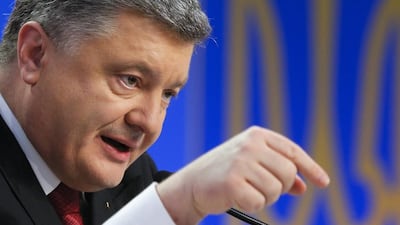If Ukraine's leadership had set out to poke the Russian bear with a very sharp stick they could hardly have done a better job. Early last week, the Ukrainian parliament voted to renounce the country's non-aligned status, putting the former Soviet republic on a path that heads towards membership of Nato. The move was immediately welcomed by a spokesman for the military alliance, who said: "Ukraine will become a member of Nato if it so requests and fulfils the standards and adheres to the necessary principles."
Within days Russian president Vladimir Putin announced he had signed a new military doctrine, which identifies Nato as his nation's greatest threat. The escalation can hardly have pleased the leaders of the Baltic States, Poland and Romania, all Nato members, given that Mr Putin was quoted as having told Ukrainian president Petro Poroshenko in September that, if he wanted, "Russian troops could not only be in Kiev in two days, but in Riga, Vilnius, Tallinn, Warsaw or Bucharest, too".
But the heightened tensions were hardly unexpected. There appears to be widespread amnesia about what Russia was promised when the Soviet era was coming to a close and its satellite states were released from the Communist grip. The current prime minister and former president Dmitry Medvedev said in an interview with Der Spiegel a few years ago that “Nato would not expand endlessly eastward and our interest would continuously be taken into consideration”. The last Soviet leader, Mikhail Gorbachev, recalled that the Atlantic alliance was not to advance “as much as a thumb’s width further to the East”. Meanwhile, Der Spiegel concluded after examining the archives and speeches by key figures such as the long-serving German foreign minister Hans-Dietrich Genscher “that there was no doubt that the West did everything it could to give the Soviets the impression that Nato membership was out of the question for countries like Poland, Hungary or Czechoslovakia”. 0
Whatever promises were made, they were not kept for long. Poland, Hungary and Czechoslovakia joined Nato in 1999, followed by Bulgaria, Romania, Slovenia, Slovakia, Estonia, Lithuania and Latvia in 2004 and Albania and Croatia in 2009. The attempt to absorb more and more states in Russia’s backyard proved costly in 2008 with moves for Georgia to start the accession process. Mr Putin, then prime minister of Russia, warned that this “would be taken as a direct threat to the security of our country”. Shortly afterwards, he showed that he meant it. After that summer’s Russo-Georgia war, the crushed Caucasian republic lost its appetite for Nato membership.
But it doesn’t seem to matter how much Russia demonstrates that the alliance is unwelcome on its borders. Former US secretary of state Henry Kissinger recently warned of the risk of a new Cold War, which he said would be “a historic tragedy”. But Kiev and Nato seem to believe that further confrontation will force the Russian president to back down. This is likely to backfire disastrously, as Mr Putin’s annexation of Crimea showed. This came after what he viewed, with some justification, as a western coup against Ukraine’s pro-Russian but democratically elected president, Victor Yanukovych.
This is not to suggest that the only safe course is endless capitulation to Mr Putin. The relationship as a whole between the West and Russia needs to be reassessed. Russia’s sense of itself, of its history, and of the deep humiliation that followed the break-up of the Soviet Union and the country’s relegation to second tier status internationally needs to be taken into account.
Mr Kissinger, a serious scholar with a deep appreciation of how a nation’s past affects its view of the present, understands that. “I don’t think Putin believes the system of government in Russia is inherently incompatible with the system of government in the West,” he said last month. “He feels deeply aggrieved by Western actions and he reacts in a manner that Peter the Great would have understood.”
Mr Putin demands that Russia be treated with respect. That extends to not duping him on the world stage, as he believes the West did over his support for a no-fly zone over Libya. It became a cover for regime change.
It is, of course, for the Ukrainian parliament to make decisions concerning their country. But just because that country’s current leadership wants to join Nato, doesn’t mean the alliance has to welcome the aspiration. US academic John Mearsheimer wrote in Foreign Affairs magazine this autumn that, “in the eyes of the Russian leaders, EU expansion is a stalking horse for Nato expansion.” Accordingly, it might be wise for both Nato and the EU to stop their respective quests to grow larger.
If charity begins at home, so does ensuring that your house is in order before you invite more guests to join you – especially if that means riling a neighbour already upset at your party encroaching upon his space.
Sholto Byrnes is a Kuala Lumpur-based commentator and takes up the position of Senior Fellow at the Institute of Strategic and International Studies, Malaysia, in the New Year


